

Simultaneity And Time Dilation – College Physics. Ludwig Boltzmann. Ludwig Eduard Boltzmann (German pronunciation: [ˈluːtvɪg ˈbɔlt͡sman]; February 20, 1844 – September 5, 1906) was an Austrian physicist and philosopher.
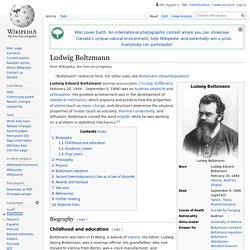
His greatest achievement was in the development of statistical mechanics, which explains and predicts how the properties of atoms (such as mass, charge, and structure) determine the physical properties of matter (such as viscosity, thermal conductivity, and diffusion). Boltzmann coined the word ergodic while he was working on a problem in statistical mechanics.[2] J. Willard Gibbs. Josiah Willard Gibbs (1839-1903) was an American mathematical physicist whose work in statistical mechanics laid the basis for the development of physical chemistry as a science. On April 20, 2007, APS presented a plaque to the Yale physics department in his honor. Albert Einstein called him "the greatest mind in American history. " Gibbs’s studies of thermodynamics and discoveries in statistical mechanics paved the way for many of Einstein’s later discoveries. Gibbs is also known as the "father of vector analysis", or the formal study of vectors in math, and is largely responsible for the widespread use of vectors in physics, replacing the quaternions that William Rowan Hamilton had earlier discovered.
Josiah Willard Gibbs was born February 11, 1839, in New Haven, Connecticut. Josiah Willard Gibbs. American physicist In 1863, Yale awarded Gibbs the first American doctorate in engineering.
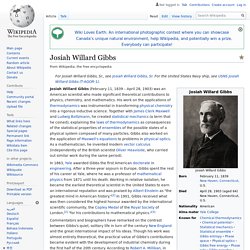
After a three-year sojourn in Europe, Gibbs spent the rest of his career at Yale, where he was a professor of mathematical physics from 1871 until his death. Working in relative isolation, he became the earliest theoretical scientist in the United States to earn an international reputation and was praised by Albert Einstein as "the greatest mind in American history. "[2] In 1901, Gibbs received what was then considered the highest honour awarded by the international scientific community, the Copley Medal of the Royal Society of London,[2] "for his contributions to mathematical physics.
Geometry/Right Triangles and Pythagorean Theorem. Right triangles[edit] Right triangles are triangles in which one of the interior angles is 90o.
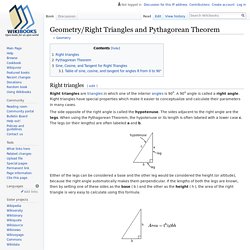
A 90o angle is called a right angle. Right triangles have special properties which make it easier to conceptualize and calculate their parameters in many cases. Pythagorean Triples. Right-angled triangles with whole number sides have fascinated both professional mathematicians and number-enthusiasts since well before 300 BC when Pythagoras wrote about his famous "theorem".

The oldest mathematical document in the world, a little slab of clay that would fit in your hand, is a list of such triangles. So what is so fascinating about them? This page starts from scratch and has lots of facts and figures with several online calculators to help in your own investigations. Mens the link next to it is to an interactive Calculator on this page Pythagoras and Pythagoras' Theorem. Pythagorean Triangles and Triples. The calculators on this page require JavaScript but you appear to have switched JavaScript off (it is disabled).

Please go to the Preferences for this browser and enable it if you want to use the calculators, then Reload this page. Right-angled triangles with whole number sides have fascinated mathematicians and number enthusiasts since well before 300 BC when Pythagoras wrote about his famous "theorem". Pythagoras table on right angled triangles. Special relativity. In physics, special relativity (SR, also known as the special theory of relativity or STR) is the generally accepted and experimentally well-confirmed physical theory regarding the relationship between space and time.
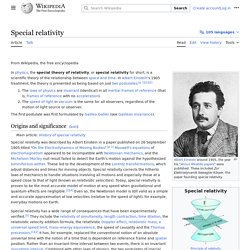
In Albert Einstein's original pedagogical treatment, it is based on two postulates: It was originally proposed by Albert Einstein in a paper published 26 September 1905 titled "On the Electrodynamics of Moving Bodies". [p 1] The inconsistency of Newtonian mechanics with Maxwell's equations of electromagnetism and the lack of experimental confirmation for a hypothesized luminiferous aether led to the development of special relativity, which corrects mechanics to handle situations involving motions at a significant fraction of the speed of light (known as relativistic velocities).
As of today, special relativity is the most accurate model of motion at any speed when gravitational effects are negligible. Traditional "two postulates" approach to special relativity[edit] where. Simultaneity Bias: Simple Definition - Statistics How To. Regression Analysis > Simultaneity Bias What is Simultaneity?

Simultaneity is where the explanatory variable is jointly determined with the dependent variable. In other words, X causes Y but Y also causes X. Design for All Saints picture, 1508 - Albrecht Durer. All Saints picture, 1511 - Albrecht Durer. What is the collective mind? Collective consciousness. Other uses of the term[edit] According to a theory the character of collective consciousness depends on the type of mnemonic encoding used within a group (Tsoukalas, 2007).

The specific type of encoding used has a predictable influence on the groups behavior and collective ideology. Informal groups, that meet infrequently and spontaneously, have a tendency to represent significant aspects of their community as episodic memories. Definition of Of One Mind by Merriam-Webster. Of one mind. Definition from Wiktionary, the free dictionary Jump to navigationJump to search English[edit] Prepositional phrase[edit]
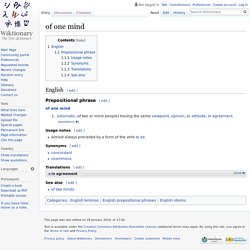
Of-one-mind dictionary definition. Definition of Supermind by Merriam-Webster. Supermind. Lucretius carus. Lucretius. Roman poet and philosopher Titus Lucretius Carus ( TY-təs loo-KREE-shəs, Latin: [ˈtɪtʊs lʊˈkreːtɪ.ʊs ˈkaːrʊs]; c. 99 – c. 55 BC) was a Roman poet and philosopher.
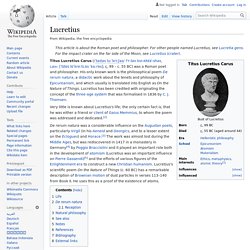
His only known work is the philosophical poem De rerum natura, a didactic work about the tenets and philosophy of Epicureanism, and which usually is translated into English as On the Nature of Things. Lucretius has been credited with originating the concept of the three-age system that was formalised in 1836 by C. J. Thomsen. Heraclitus. Pre-Socratic Greek philosopher Due to the oracular and paradoxical nature of his philosophy, and his fondness for word play, he was called "The Obscure" even in antiquity.
He wrote a single work, On Nature, but the obscurity is made worse by its remaining only in fragments. His cryptic utterances have been the subject of numerous interpretations. He's been seen variously as a "material monist or a process philosopher; a scientific cosmologist, a metaphysician, or mainly a religious thinker; an empiricist, a rationalist, or a mystic; a conventional thinker or a revolutionary; a developer of logic or one who denied the law of non-contradiction; the first genuine philosopher or an anti-intellectual obscurantist. Pre-established harmony. Overview[edit] Leibniz's theory is best known as a solution to the mind–body problem of how mind can interact with the body. Gottfried Wilhelm Leibniz. German mathematician and philosopher Gottfried Wilhelm (von) Leibniz[a][b] (;[11] German: [ˈɡɔtfʁiːt ˈvɪlhɛlm fɔn ˈlaɪbnɪts][12][13] or [ˈlaɪpnɪts];[14] 1 July 1646 [O.S. 21 June] – 14 November 1716) was a prominent German polymath and one of the most important logicians, mathematicians and natural philosophers of the Enlightenment.
Leibniz, Gottfried: Metaphysics. The German rationalist philosopher, Gottfried Wilhelm Leibniz (1646-1716), is one of the great renaissance men of Western thought. He has made significant contributions in several fields spanning the intellectual landscape, including mathematics, physics, logic, ethics, and theology. Monadology. Definition of antinomian in English by Oxford Dictionaries.
Adjective. Antinomianism. Noun a person who maintains that Christians are freed from the moral law by virtue of grace as set forth in the gospel. Antinomianism. In Christianity, an antinomian is "one who holds that under the gospel dispensation of grace the moral law is of no use or obligation because faith alone is necessary to salvation".[1] Many antinomians, however, believe that Christians will obey the moral law despite their freedom from it.
Definition of Antinomian by Merriam-Webster. Man on his Nature. Amazon.com: Man on his Nature (9780521064361): Charles Sherrington: Books. Man on his nature - Sir Charles Scott Sherrington. Philosophie Zoologique, by Jean-Baptiste Lamarck (1809) Philosophie zoologique. Amazon. Zoological Philosophy: An Exposition with Regard to the Natural History of ... - Jean Baptiste Pierre Antoine de Monet de Lamarck. Philosophie zoologique. Amazon. Amazon. Evolution: The Modern Synthesis. Semon, Richard (1859-1918) Richard Semon. Hylozoism. Hylozoism is the philosophical point of view that matter is in some sense alive. “Mind and Matter” by Erwin Schrödinger (Complete Lecture and Transcript) "Action and Forgetting: Bergson's Theory of Memory" by Kebede, Messay - Philosophy Today, Vol. 60, Issue 2, Spring 2016. Pythagorean theorem. Arrow of time.
Mind and matter : the Tarner lectures delivered at Trinity College, Cambridge, in October 1956 (Book, 1959) SCHRÖDINGER Erwin. – Mind and Matter : The «Tarner Lectures» delivered at Trinity College, Cambridge, in October 1956. Amazon. Amazon. Aldous Huxley book london, shadow, and windus 1946. Time of expectation ewin schodinger. Time Will Run Back - Henry Hazlitt. Aldous Huxley book 1946. The Perennial Philosophy. Book of Nature Book by Conrad of Megenberg.